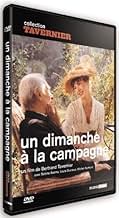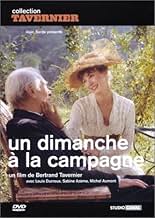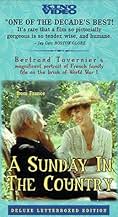Un dimanche à la campagne
- 1984
- Tous publics
- 1h 30m
IMDb RATING
7.4/10
3.4K
YOUR RATING
An elderly painter whose son visits with his family on the weekends, is also surprised by a visit from his still-single daughter.An elderly painter whose son visits with his family on the weekends, is also surprised by a visit from his still-single daughter.An elderly painter whose son visits with his family on the weekends, is also surprised by a visit from his still-single daughter.
- Director
- Writers
- Stars
- Nominated for 1 BAFTA Award
- 13 wins & 12 nominations total
Sabine Azéma
- Irène
- (as Sabine Azema)
Geneviève Mnich
- Marie-Thérèse
- (as Genevieve Mnich)
- Director
- Writers
- All cast & crew
- Production, box office & more at IMDbPro
Featured reviews
I think this film can be appreciated on several levels. For some viewers, this is just a happy family portrait, reflecting a more peaceful time and recalling one's own memories of family outings and quiet Sunday afternoons. I think this point of view is mistaken, but I can see why people feel this way. The film is externally slow- moving and peaceful, like a sunny river. But like a river, there are strong currents lurking, invisible, under the surface -- currents that cannot be seen, but only observed indirectly from their effects.
There's a lot more going on here than just ninety minutes of bucolic peacefulness. Pay attention to the details, the small looks and gestures, the things said and things left unsaid. You can almost see the fine strands that link the characters, like a spiderweb, where each character's movements are felt by all the others. The role of the narrator, often disparaged in film, is used effectively here, giving the film a somewhat novel-like quality and reminding the viewer of their presence as an observer.
There's more to be said about this film, but I don't feel quite up to it. In any case, the real meaning of the film can't easily be described in words -- which is a good thing, or the film would be unnecessary. So watch the film yourself, if you haven't already, and see what you think.
There's a lot more going on here than just ninety minutes of bucolic peacefulness. Pay attention to the details, the small looks and gestures, the things said and things left unsaid. You can almost see the fine strands that link the characters, like a spiderweb, where each character's movements are felt by all the others. The role of the narrator, often disparaged in film, is used effectively here, giving the film a somewhat novel-like quality and reminding the viewer of their presence as an observer.
There's more to be said about this film, but I don't feel quite up to it. In any case, the real meaning of the film can't easily be described in words -- which is a good thing, or the film would be unnecessary. So watch the film yourself, if you haven't already, and see what you think.
A film that tells a story of a family gathering in a Sunday without not interesting happening had all motives to be boring.
Slow scenes, children running and playing, the grandpa happy for receiving his well behaved and always present son and waiting for the surprise of the sister coming. Will she come? Yes, and not interesting happens except for scenes from real life.
The grandpa puts his granddaughter on the shoulders and gets tired. He complains with the maid for the shoes that were obviously where they were meant to be.
The daughter is independent and unhappy, but can not admit. The son made everything he was supposed to do, is married with children but is sorrow for not being a painter. Why? Because his father is a painter, contemporary of Van Gogh, Monet, Degas and followed his dreams and is much happier than his children. The year is 1905 and the history is so simple that everybody could relate to a passage or another.
Slow scenes, children running and playing, the grandpa happy for receiving his well behaved and always present son and waiting for the surprise of the sister coming. Will she come? Yes, and not interesting happens except for scenes from real life.
The grandpa puts his granddaughter on the shoulders and gets tired. He complains with the maid for the shoes that were obviously where they were meant to be.
The daughter is independent and unhappy, but can not admit. The son made everything he was supposed to do, is married with children but is sorrow for not being a painter. Why? Because his father is a painter, contemporary of Van Gogh, Monet, Degas and followed his dreams and is much happier than his children. The year is 1905 and the history is so simple that everybody could relate to a passage or another.
I saw this film many years ago and loved it and just rewatched it again, this time, on DVD with Bertrand Tavernier's commentary. I must say that I love it now even more. The two words that permeate throughout his film rhythm and time. It is strange to me that he does not say that impressionism was a major inspiration in the work, in fact he says the contrary. Yet I've noticed many films where the director meant to do something only it was taken very differently by the viewers and I guess this was such a case.
Anyway to get back to the film, in hearing Tavernier's commentary, I now realize how musical the whole film is, it's lazy, Sunday tone, then Irene (Azema) coming in like a tornado, then quiet conversations, then someone getting stuck in a tree, then another quiet conversation, then a dance...a series of stop starts that lulls you in its rhythm, but awakens you again with bursts of life and vitality.
In speaking of time and the passage of it, Tavernier encapsulates the life of Mr. Lamiral in one Sunday afternoon, and all the bittersweet sadness, through his relationship with his children, grandchildren, maid and himself through his actions and voiceovers made by an all knowing narrator.
I feel a sense of pride that Tavernier points out in his commentary the poignant scenes which I was so touched by in the first viewing. The scene where Irene tells herself that her niece would die young, the scene where Irene and her father speak of painting, The narrator supplying profound insights on M. Ladmiral about his indifference to his grandchildren. Gonzague's and his wife's decency, but utter clumsiness, living a life bounded by convention and security.
I also learned so much about camera movement through Tavernier. He describes not only the how, but why certain shots are shot they are and you begin to understand why certain scenes provoke certain emotions not only through dialogue and setting, but also how you hear something and see something. One scene where Gonzague and his wife are having an argument and M. Ladmiral comes into the scene but rather than say a word to interrupt, he concludes to himself that it is pointless and leaves the scene without uttering a word. Such a scene tells so much, the relationship of the couple, the father's relationship with the couple, and the father's relationship with himself, all in the frame of a 5 second shot. I'm grateful to M. Tavernier for having created such a beautiful film and added such brilliant insight on the nature of this work.
Anyway to get back to the film, in hearing Tavernier's commentary, I now realize how musical the whole film is, it's lazy, Sunday tone, then Irene (Azema) coming in like a tornado, then quiet conversations, then someone getting stuck in a tree, then another quiet conversation, then a dance...a series of stop starts that lulls you in its rhythm, but awakens you again with bursts of life and vitality.
In speaking of time and the passage of it, Tavernier encapsulates the life of Mr. Lamiral in one Sunday afternoon, and all the bittersweet sadness, through his relationship with his children, grandchildren, maid and himself through his actions and voiceovers made by an all knowing narrator.
I feel a sense of pride that Tavernier points out in his commentary the poignant scenes which I was so touched by in the first viewing. The scene where Irene tells herself that her niece would die young, the scene where Irene and her father speak of painting, The narrator supplying profound insights on M. Ladmiral about his indifference to his grandchildren. Gonzague's and his wife's decency, but utter clumsiness, living a life bounded by convention and security.
I also learned so much about camera movement through Tavernier. He describes not only the how, but why certain shots are shot they are and you begin to understand why certain scenes provoke certain emotions not only through dialogue and setting, but also how you hear something and see something. One scene where Gonzague and his wife are having an argument and M. Ladmiral comes into the scene but rather than say a word to interrupt, he concludes to himself that it is pointless and leaves the scene without uttering a word. Such a scene tells so much, the relationship of the couple, the father's relationship with the couple, and the father's relationship with himself, all in the frame of a 5 second shot. I'm grateful to M. Tavernier for having created such a beautiful film and added such brilliant insight on the nature of this work.
In early 20th century France, an impressionist painter is visited at his country estate by his grown children. This is a very low-key film where nothing much happens but where one experiences the satisfaction of having spent a Sunday afternoon in the country engaged in conversation with intelligent people. Ducreux is excellent as the patriarch nearing the end of his life who relishes the visit from his dutiful son and free-spirited daughter, but is overcome with feelings of nostalgia and perhaps regret. The cinematography is gorgeous, with images suggesting impressionist paintings. The soundtrack appropriately consists of chamber music, that of Faure.
I saw this film sixteen years ago, at a time when I did not see many 'filmhouse' movies yet. It made a strong impression on me, I wasn't used to so many 'open spaces' in films, which spectators have to fill according to their own ideas. Later I understood that once you start filling these 'holes' with pieces of yourself, the film becomes much more personal.
From time to time I think back to this film, like I did just now when I looked it up in the IMDB. Its storytelling, or rather story-hinting, is apparently so strong that even after sixteen years I am looking for some answers to the questions that the film raises.
In short: go see it.
From time to time I think back to this film, like I did just now when I looked it up in the IMDB. Its storytelling, or rather story-hinting, is apparently so strong that even after sixteen years I am looking for some answers to the questions that the film raises.
In short: go see it.
Did you know
- TriviaThe film is included on Roger Ebert's "Great Movies" list.
- GoofsIrene's flower in her bodice disappears and then reappears.
- SoundtracksQuintette pour piano et cordes Op. 115
Written by Gabriel Fauré
Performed by Le quatuor Via Nova, Jean Hubeau piano solo
- How long is A Sunday in the Country?Powered by Alexa
Details
- Release date
- Country of origin
- Language
- Also known as
- A Sunday in the Country
- Filming locations
- Château du Grand Saint-Léger, Villers-en Arthies, Val-d'Oise, France(house and garden)
- Production companies
- See more company credits at IMDbPro
Box office
- Gross US & Canada
- $2,411,143
- Gross worldwide
- $2,411,143
- Runtime
- 1h 30m(90 min)
- Sound mix
- Aspect ratio
- 1.66 : 1
Contribute to this page
Suggest an edit or add missing content


























